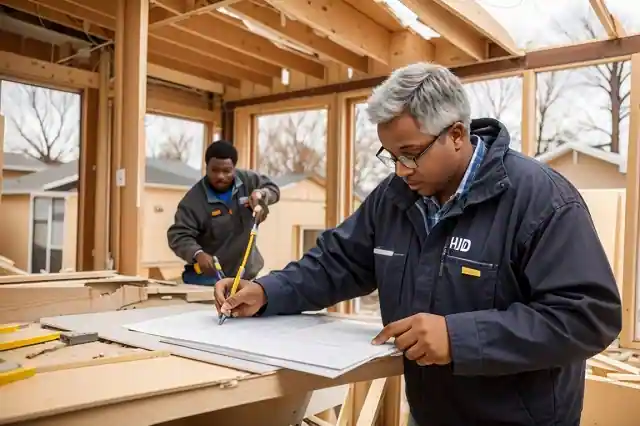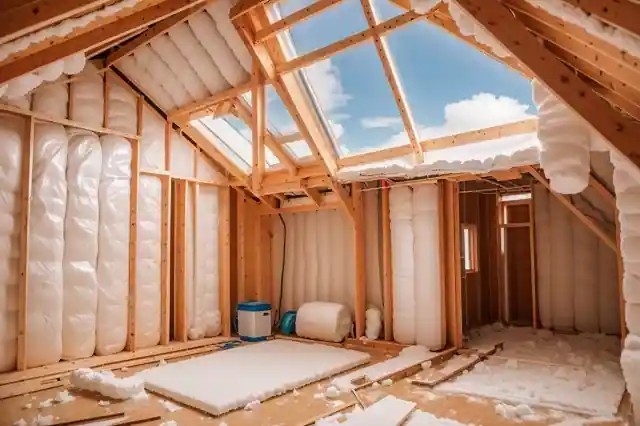As energy efficiency gains importance in today’s world, promoting sustainable home upgrades is a major responsibility of the U.S. Department of Housing and Urban Development (HUD). Through a variety of free home improvement grant assistance programs, HUD assists homeowners in upgrading their homes to become more energy-efficient, improve comfort, and lower utility costs. These grants will fund various energy-efficient improvements as 2025 draws near, assisting homeowners in lowering their carbon footprint and ultimately saving money.
This article examines the best energy-efficient improvements that HUD-free home improvement grants are anticipated to support. These improvements can have a big impact, whether you are a first-time homeowner or trying to retrofit your current house.
Why Energy Efficiency Matters in 2024-2025
Prior to discussing the specific improvements, it is critical to comprehend why energy efficiency is so important, particularly in this day and age. Due to growing environmental concerns and rising energy costs, energy-efficient homes are becoming more and more necessary. Homeowners are searching for ways to lower their energy usage more and more, as a result of the global push towards sustainability. In addition to improving living conditions and raising a home’s overall value, energy-efficient home improvements can result in significant utility bill savings.
A broader initiative to lower greenhouse gas emissions is also aided by energy-efficient homes. Improving home energy efficiency is a crucial first step in reaching environmental sustainability goals, as buildings contribute significantly to global energy consumption and carbon emissions.
Read- Homeowners Grants $15000 For Energy-Efficient Windows and Doors
Overview of HUD Home Improvement Grants
Homeowners with low and moderate incomes can use HUD home improvement grants to help them upgrade and repair their homes. Increasing energy efficiency is one of the many enhancements covered by these grants. These projects might otherwise be financially unaffordable but HUD’s financial assistance enables more homeowners to take on them.
HUD grants are available to homeowners who meet specific income requirements and reside in eligible properties, though eligibility varies by program. Landlords who rent to low-income tenants can also receive certain grants, which will help to raise the standard of affordable housing.
Read-Free Home Improvement Grants For Veterans and Low-Income Families
Supporting initiatives that lower energy use and advance sustainability demonstrate HUD’s dedication to energy efficiency. The most energy-efficient home improvements anticipated to receive funding from HUD home improvement grants in 2024–2025 are listed in the sections that follow.
Solar Panel Installation
Benefits of Solar Energy for Homeowners
One of the best strategies to lessen a home’s dependency on conventional energy sources is to use solar energy. Homeowners can lower their utility costs and help the environment by installing solar panels to produce their own electricity. Depending on local laws, electricity generated by solar panels can be sold back to the grid or used to power a house.
How HUD Grants Can Help Cover Costs
HUD home improvement grants can help defray some of the initial costs associated with installing solar panels. These grants increase the number of homeowners who can afford solar energy by partially defraying the installation costs. A lot of states also provide tax credits and incentives for solar energy systems which lessens the financial burden even more.
Read- Harnessing Sustainability: Renewable Energy Grants and Window Replacement
Long-Term Savings and Return on Investment
Purchasing solar panels can result in significant long-term financial savings. Even though the initial outlay might be substantial, the savings on monthly energy costs can yield a complete return on investment in a matter of years. Homeowners can save thousands of dollars on energy bills over the solar panels’ lifetime, making this upgrade one of the most affordable choices for anyone wishing to increase the energy efficiency of their house.
Energy-Efficient Windows and Doors
Importance of Proper Insulation in Reducing Energy Costs
The energy efficiency of a house is greatly influenced by its windows and doors. Because poorly insulated windows and doors let heat escape in the winter and enter in the summer, they can result in a large energy loss. In addition to using more energy, this reduces the comfort level of a house.
Types of Energy-Efficient Windows and Doors
The market offers a variety of energy-efficient home window and door options such as insulated frames, low-emissivity (Low-E) glass, and double- or triple-pane windows. By reducing heat transfer, these products will keep your house cooler in the summer and warmer in the winter.
Read- Replace Home Windows With Free Window Replacement Grants
How to Apply for HUD Funding for These Upgrades
Old inefficient windows and doors can be replaced with energy-efficient models with HUD grants. It is critical to include comprehensive details about the precise products you intend to install and how they will increase the energy efficiency of your house when applying for a HUD home improvement grant. A contractor with experience in energy-efficient upgrades can help make sure your application gets approved.
Read- Free Energy-Efficient Window Replacement Grants For Veterans
Upgrading to Energy Star Appliances
Overview of Energy Star-Rated Appliances
Energy Star is a program that certifies products that adhere to stringent energy efficiency standards set by the U.S. Environmental Protection Organization. Compared to regular models, Energy Star-rated appliances consume less energy, which lowers their environmental impact and helps homeowners save money on utility bills.
Which Appliances Are Eligible for HUD Funding
Energy Star appliances including water heaters, dishwashers, washing machines, and refrigerators can be purchased with HUD home improvement grants. Because of their improved design, these appliances use less water and electricity while maintaining the same level of performance.
Read-HUD Home Repair Grants For Single Moms- Check Options
How New Appliances Can Significantly Reduce Energy Consumption
You can save a lot of energy by switching out outdated inefficient appliances with Energy Star models. During its lifetime, an Energy Star dishwasher can save up to 1800 gallons of water, and an Energy Star refrigerator uses roughly 15% less energy than non-certified models. For homeowners who are concerned about their energy, using Energy Star appliances is a wise investment because of these cumulative savings.
HVAC System Upgrades
Importance of Efficient Heating and Cooling Systems
The majority of a home’s energy usage is caused by the heating, ventilation, and air conditioning (HVAC) systems. Uneven temperatures throughout the house and excessive energy costs can result from an ineffective HVAC system. A home’s comfort and energy efficiency can be significantly increased by switching to a more effective system.
Types of HVAC Systems Covered by HUD Grants
High-efficiency furnaces, air conditioners, and heat pumps are examples of HVAC systems that can be upgraded with HUD home improvement grants. Grants can also be utilized to install programmable thermostats, which give homeowners more precise control over their HVAC system and cut down on energy waste.
Read- Free Furnace Replacement Grants For Senior Citizens
Potential Energy and Cost Savings
Making the switch to a high-efficiency HVAC system can result in considerable financial and energy savings. A high-efficiency furnace, for instance, can use up to 30% less energy than a typical model, and a high-efficiency air conditioner can save 20–40% on cooling expenses. For homeowners, the upgrade is a smart investment because these savings can eventually cover more than the cost.
Insulation and Weatherization
The Role of Insulation in Energy Efficiency
One of the key elements affecting a home’s energy efficiency is insulation. Reducing the need for heating and cooling is possible through proper insulation, which keeps heat outside in the summer and inside in the winter. Inadequate insulation can cause large energy losses in homes raising utility costs and making living conditions less comfortable.
How Weatherization Prevents Energy Loss
In order to stop air from leaking into a house weatherization entails caulking any openings or crevices in the exterior. Storm windows duct sealing and weather stripping windows and doors are a few examples of this. By preventing drafts and keeping conditioned air inside the house these actions increase energy efficiency.
Read- Affordable Home Insulation Options-Costs and Grants
HUD’s Support for Insulation and Weatherization Projects
Homeowners can increase the energy efficiency of their homes more easily by using HUD-free home improvement grants to finance weatherization and insulation projects. Particularly in older homes that might not have enough insulation, these projects can result in significant energy savings.
Water Heater Upgrades
Why Efficient Water Heaters Matter
In the majority of homes, one of the biggest energy costs is water heating. Conventional water heaters have the potential to be inefficient wasting money and energy. Utility costs can be decreased and energy consumption decreased by switching to an energy-efficient water heater.
Types of Energy-Efficient Water Heaters
Solar water heaters, heat pump water heaters, and tankless water heaters are a few of the energy-efficient water heater varieties that are available. The best option will depend on the location and particular needs of your home, as each of these options has unique advantages.
HUD Grants and Water Heater Upgrades
The cost of switching to a more energy-efficient water heater may be partially covered by HUD home improvement grants. Homeowners can save money and enjoy dependable hot water by selecting an energy-efficient model.
Smart Home Technology Integration
The Role of Smart Technology in Energy Efficiency
With the help of smart home technology, homeowners can better monitor and manage their energy consumption. Homeowners can create more efficient spaces and cut down on energy waste by implementing smart appliances lighting controls and thermostats.
Popular Smart Home Upgrades Funded by HUD
Installing smart home technologies like energy monitoring gadgets, smart lighting systems, and programmable thermostats can be paid for with HUD grants. With the aid of these improvements, homeowners can maximize their energy use, resulting in reduced utility costs and a cozier home.
How to Maximize Energy Savings with Smart Home Technology
Homeowners should select smart home technologies that complement their current systems and way of life in order to optimize energy savings. Smart lighting systems and programmable thermostats, for instance, can be configured to lower heating and cooling when no one is home. be set up to automatically shut off when a room is not being used. Over time, small adjustments like these can result in large energy savings.
Cool Roofing Materials
What Are Cool Roofs?
Compared to traditional roofing materials, cool roofs are made to reflect more sunlight and absorb less heat. This lowers energy expenses and the need for air conditioning by keeping homes cooler.
Benefits of Installing a Cool Roof
Significant energy savings are possible with cool roof installation, particularly in hotter climates where air conditioning can be expensive. Because cool roofs minimize thermal expansion and contraction, which over time can lead to wear and tear, they can also prolong a roof’s lifespan.
HUD Funding for Cool Roofing Projects
Installing cool roofing materials can be paid for with HUD home improvement grants. Homeowners in warmer climates will especially benefit from this upgrade because it can result in significant energy savings.
Conclusion: Maximizing Your HUD Grant for Energy Efficiency
Upgrades that use less energy benefit both the environment and your pocketbook. Homeowners can significantly enhance their properties and lower energy consumption and utility bills by utilizing HUD home improvement grants. Upgrades like adding solar panels, modernizing your HVAC system, or just swapping out outdated appliances can result in long-term cost savings and a cozier home.
The improvements that will benefit your home the most should be carefully considered when applying for a HUD home improvement grant. You can get the most out of your grant and improve your home and the environment by giving priority to energy-efficient projects.
These improvements will be essential to the creation of more economical and sustainable living environments, as energy efficiency remains a primary concern for both government initiatives and homeowners. Spend some time considering your options and taking advantage of the HUD home improvement grant opportunities. The earth, your house, and your pocketbook will all appreciate it.